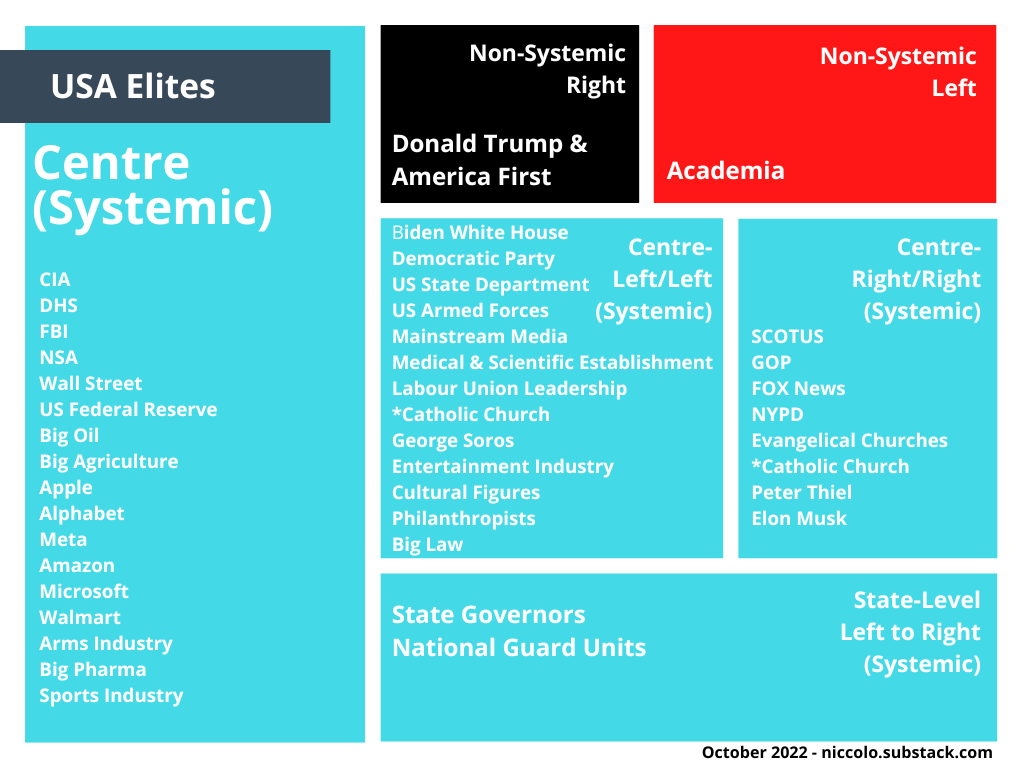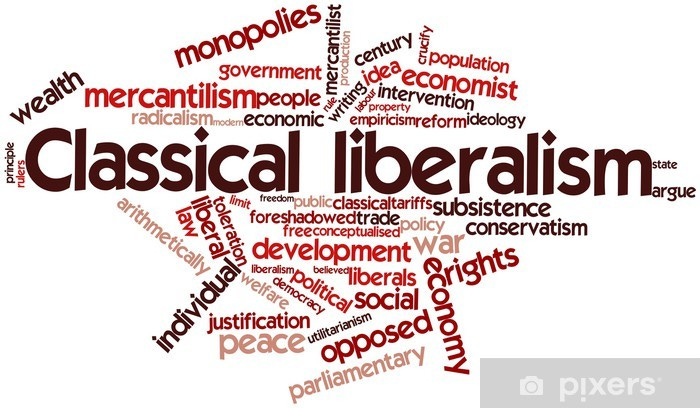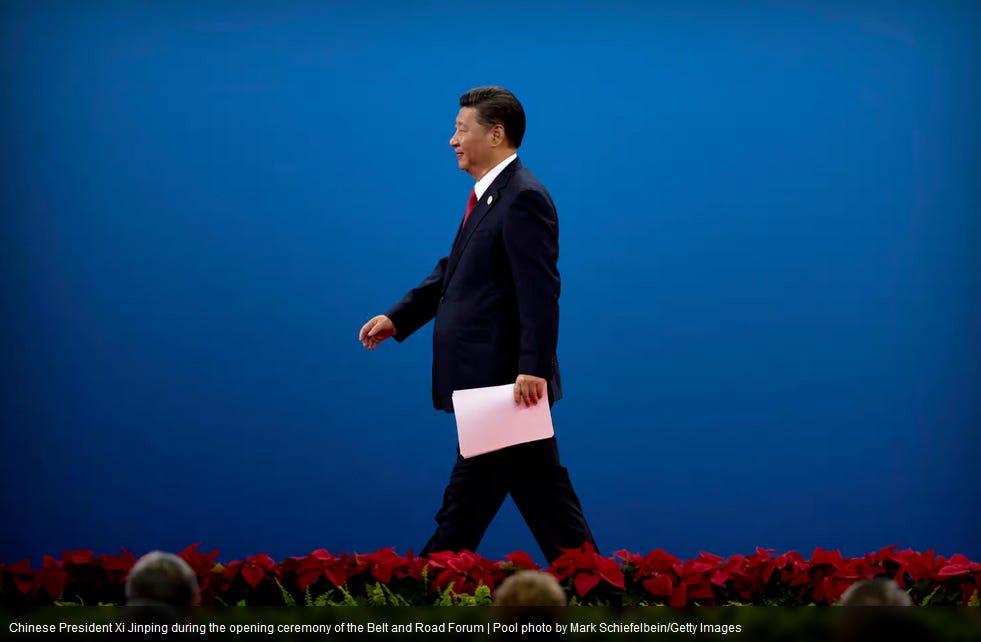Saturday Commentary and Review #102
#MAGACommunism?????, Classical Liberalism vs. The New Right, UK Economy in Dire Straits, US to EU: Cut Down on Trade With China Now!, the Revolutionary Jean-Luc Godard
“If it ain’t broke, don’t fix it!”
- Thomas Bertram Lance, Director of the Office of Management and Budget under President Jimmy Carter
If you ask the median left-wing American, they will laugh out loud at the idea that the USA continues to move to the political left, and will insist that it is a right wing country due to its capitalism, imperialism, and rejection of re-distributive economic policies. A right-wing American will laugh just as loud if he or she hears his or her country being described as being on the political right.
Both are right to laugh, as the traditional political spectrum runs into a bit of trouble when mapped onto US politics. Terms and concepts are corrupted (the best example is of free market economics being considered ‘conservative’ and therefore right-wing, when it is in fact a wholly liberal construct, thus belonging to the centre), making attempts at classification inevitably descend into extremely pedantic debates that are a waste of time.
Instead, I (and others) offer up a new visualization, one that I’d provide if I had the graphic design skill-set to do so: a spectrum where anti-systemic politics sit on the opposite poles, and the bulk of the spectrum is occupied by systemic politics representing everything encompassing the Democrats and everyone in the GOP minus Trump/#MAGA. In the meantime, I’ll trot out this visualization from a piece that I wrote recently to make due for now:
In this graphic representation, all the centres of power in blue are ‘systemic’. ‘Non-systemic’ elites are represented in black and red. However, the portion in red INFORMS and INFLUENCES much of what is happening in the blue sections, dragging the USA towards it. This is one of the most important (among many) reasons as to why the ruling elites are trying to disqualify Donald Trump from running for the Presidency in 2024. It is also why the elites in the red section adhere to Thomas Bertram Lance’s proverb.
The above graphic concerns itself only with ruling elites, so therefore it is not a comprehensive topography of the present US political scene. For example, many American leftists are disaffected with mainstream left-wing politics in the USA. Quite a lot feel that too many traditional left-wing interests have been watered-down or compromised in the name of pragmatism. Just as many are thoroughly revolted by its current identity politics that places race, gender, and sexual orientation above the identity that the left has traditionally championed: class.
It is this last group, almost entirely composed of Marxist-Leninists, with whom we will concern ourselves today. For them, the class struggle trumps all else. Therefore, telling them that class is to sit at the back of the bus is a betrayal of core left-wing ideology. They view the mainstream American left wing as ‘sell-outs’ co-opted by capitalism, and thus drained of any real revolutionary potential. One segment of this group has, like myself, identified #MAGA as the only real revolutionary force present in US politics today. This type has been grouped under the seemingly paradoxical label: #MAGA Communism.
The premise of Al-Din’s argument is that Trump fundamentally and irreversibly changed American politics—for the better, if one believes in class struggle. Before 2016, the political landscape in the United States was confined to two choices—Democrat or Republican—that were situated along different points of a narrow establishment continuum. Anyone who didn’t pledge allegiance to the status quo (including communists) was relegated to the margins of the political system—if not regarded as an enemy of the state.
With Trump all this changed. For the first time in a long time, a mass movement emerged that situated itself outside of the status quo—against the status quo, in fact. “This means that radical political distinctions, rather than simple differences of opinion, are now possible, even in the realm of our democratic state. This is the beauty of the MAGA movement,” says Al-Din in one video.
This matches my argument perfectly.
Pragmatism and opportunism:
What matters is that MAGA reintroduces class struggle to American politics—not only because the MAGA movement draws its support base mainly from the working class, but “because class struggle in politics, as Lenin pointed out, means the introduction of Clausewitzian enmity in politics.”
This, says Al-Din, means recognizing that “the primary contradiction in American politics is between MAGA and the status quo. … Partisanship has made its definite return in the United States solely in the MAGA movement, which has again reintroduced real political enmity and distinction to the belly of the globalist beast itself.” The point is not what Trump says, but what he means to people. And when people fly the Trump flag, what they’re saying is: “Fuck the World Economic Forum, fuck Big Tech, fuck Big Pharma, fuck the status quo.”
American communists, Al-Din argues, are therefore faced with a stark choice: They can either remain within the safe space of ideologically consistent but politically irrelevant echo chambers, or they can choose to engage with the real political contradictions of contemporary America. They can join leftists in demonizing MAGA supporters as inherently racist, xenophobic, and so on, which effectively means siding with the status quo, or they can sacrifice ideological purity and side with the only mass working-class and anti-establishment movement that currently exists in America. There is no middle path.
The only REAL revolutionary energy in the USA is located within #MAGA.
By championing #MAGA and Trump for strategic reasons, Marxist-Leninists hope to force an opening that they themselves can exploit:
It’s safe to say the prospect of socialist ideas spreading among American workers is not one the country’s ruling classes look upon favorably. But the advocates of #MAGACommunism hope to make communism appealing to ordinary working-class people by decoupling it from the toxic ideology of leftism. Whereas the latter has turned into a fanatical and anti-popular ideology that looks down upon the masses, and despises everything most people hold dear—nation, family, tradition—#MAGACommunists claim to be reclaiming a revolutionary legacy rooted in a deep patriotic respect for the national, familial, and cultural premises that define a people.
“Socialism with American characteristics,” as they call it, does not aim to change all private-property relations, let alone abolish all private property. On the contrary, it is one that aims to overthrow the monopolists, the bankers, Big Pharma, Big Agriculture, Big Tech and others, in order to allow people have more things, not less.
This is a tall order, as the author of this piece, Thomas Fazi (who hasn’t replied to my email yet!!!!!!), correctly explains:
And if the goal is to transcend the left-right spectrum altogether, #MAGACommunists are bound to discover that the dichotomy is harder to kill than they think, especially by resorting to a term (communism) that is arguably impossible to extricate from that dichotomy. Moreover, so-called culture-war issues—from abortion to race—have become part and parcel of contemporary politics, and can’t be wished away in the name of working-class unity.
What it does represent is a solid grasp of the conditions on the playing field at present.
Most of my readers know who Tyler Cowen is thanks to his very, very popular site Marginal Revolution. He is taking stock of the shifts on the US political scene as well, and has published his thoughts on what he calls “The New Right” from his self-confessed classic liberal standpoint:
It has become increasingly clear that the political Right in America is not what it used to be. In particular, my own preferred slant of classical liberalism is being replaced. In its stead are rising alternatives that don’t yet have a common name. Some are called “national conservatism,” and some (by no means all) strands are pro-Trump, but I will refer to the New Right. My use of the term covers a broad range of sources, from Curtis Yarvin to J.D. Vance to Adrian Vermeule to Sohrab Ahmari to Rod Dreher to Tucker Carlson, and also a lot of anonymous internet discourse. Most of all I am thinking of the smart young people I meet who in the 1980s might have become libertarians, but these days absorb some mix of these other influences.
The classical liberal view:
A common version of the standard classical liberal view stresses the benefits of capitalism, democracy, civil liberties, free trade (with national security exceptions), and a generally cosmopolitan outlook, which in turn brings sympathy for immigration. The role of government is to provide basic public goods, such as national defense, a non-exorbitant safety net, and protection against pandemics.
In the classical liberal view, elites usually fall short of what we would like. They end up captured by some mix of special interest groups and poorly informed voters. There is thus a certain disillusionment with democratic government, while recognizing it is the best of available alternatives and far superior to autocracy for basic civil liberties.
That said, classical liberals do not consider the elites to be totally hopeless. After all, someone has to steer the ship and to this day we do indeed have a ship to steer. Most elites are intelligent and also they are as well-meaning as the rest of us, even if the bureaucratic nature of politics hinders their performance. We can entrust them with supplying basic public goods, and indeed we have little choice. Those truths hold even if the DMV will never be as efficient as Amazon, and even if sometimes our elites commit grave errors, for instance when the Johnson administration escalated the Vietnam War, to cite one example of many.
In the classical liberal view, the great failing of elites is that they do not keep society as free as it ought to be.
Two elements are to be noticed in this above portion: 1) a faith in the good intentions of elites and 2) a worldview that maximizes individual liberty at the cost of collective interests.
Regarding the challenge posed by the “New Right”:
The New Right thinkers are far more skeptical of elites. They are more likely to see elites as evil and pernicious, and sometimes they (implicitly) see these evil elites as competent enough to actually wreck society. The classical liberals see checks and balances as strong enough to limit the worst outcomes, whereas the New Right sees ideological conformity and indeed collusion within the Establishment. Checks and balances are a paper tiger.
Once you start seeing elites as so bad and also so collusive, many other changes in your views might follow. You might become more skeptical about free speech, because you view it as a recipe for putting a lot of power in the hands of (often Democratic-led) major tech companies. And is there de facto free speech if a conservative sociologist cannot get hired at Yale? You also might become more skeptical about immigration, not because you are racist (though of course there are racists), but because you see it as a plot of the Democratic Party to remake America in a new image and with a new set of voters (“you will not replace us!”). Free trade becomes seen as a line peddled by the elite, and that is an elite unconcerned with the social and national security costs of a deindustrialized America. Globalization more generally becomes a failed project of the previous elite.
The New Right doesn’t entirely reject the basic principles of free market economics, but it does try to transcend libertarian views with a deeper understanding of the current power structure. In each case there are sociological forces operating that are seen as more important than “mere” free market economics. In this regard the New Right has a more interdisciplinary worldview than do many of the classical liberals. The New Right thinkers regard most power as cultural in nature, rather than rooted in coercive government alone.
Tyler is thus far being very fair here. The New Right (to use his term) views American elites not as well-intended do-gooders who sometimes make mistakes (they are human after all), but actively hostile to their interests. I cannot fathom how anyone can continue to give current ruling elites the benefit of the doubt as a classical liberal would do.
Credit to the New Right:
Most classical liberals are uncomfortable with the New Right approaches, and seek to disavow them. I share those concerns, and yet I also recognize that hard and fast lines are not so easy to draw. The New Right is in essence accepting the original classical liberal critique of the state and pushing it a few steps further, adding further skepticism of elites, a greater emphasis on culture, and a belief in elite collusion rather than checks and balances. You may or may not agree with those intellectual moves, but many common premises still are shared between the classical liberals and the New Right, even if neither side is fully comfortable admitting this.
The New Right also tends to see the classical liberals as naïve about power (the same charge classical liberals fling at the establishment), and as standing on the losing side of history. Those aren’t the easiest arguments to refute. Furthermore, the last twenty years have seen 9/11, a failed Iraq War, a major financial crisis and recession, and a major pandemic, mishandled in some critical regards. It doesn’t seem that wrong to become additionally skeptical about American elites, and the New Right wields these points effectively.
He remains unpersuaded though:
While I try my best to understand the New Right, I am far from being persuaded. One worry I have is about how it initially negative emphasis feeds upon itself. Successful societies are based on trust, including trust in leaders, and the New Right doesn’t offer resources for forming that trust or any kind of comparable substitute. As a nation-building project it seems like a dead end. If anything, it may hasten the Brazilianification of the United States rather than avoiding it, Brazil being a paradigmatic example of a low trust society and government.
I also do not see how the New Right stance avoids the risks from an extremely corrupt and self-seeking power elite. Let’s say the New Right description of the rottenness of elites were true – would we really solve that problem by electing more New Right-oriented individuals to government? Under a New Right worldview, there is all the more reason to be cynical about New Right leaders, no matter which ideological side they start on. If elites are so corrupt right now, the force corrupting elites are likely to be truly fundamental.
The New Right also overrates the collusive nature of mainstream elites. Many New Right adherents see a world ever more dominated by “The Woke.” In contrast, I see an America where Virginia elected a Republican governor, Louis C.K. won a 2022 Grammy award on a secret ballot and some trans issues are falling in popularity. Wokism likely has peaked. Similarly, the New Right places great stress on corruption and groupthink in American universities. I don’t like the status quo either, but I also see a world where the most left-wing majors – humanities majors – are losing enrollments and influence. Furthermore, the internet is gaining in intellectual influence, relative to university professors.
It is very, very difficult for me to understand how guys like Cowen (or David French) fail to see that the high-trust society is dead and buried in the USA. The New Right recognizes this fact, which is why it doesn’t concern itself with it.
Even more worrying is Cowen seeing some sort of significance in a GOP Governor of Virginia. The Governor is a mainline Republican, not a maverick of any sort. He won due to liberals overplaying their hand, combined with a horribly run campaign.
Most worryingly of all, Tyler thinks “Wok(e)ism” has peaked. Let’s pretend that this is the case for a moment; how does this address its capture of so many governing institutions, its codification into law, and the changes that it has made to culture and society as a whole? Does he have a strategy for its total roll-back? Or is he just hoping that it stops here?
The excerpts from his piece that I have posted do not reflect the whole of his view on ‘The New Right’, so I urge you to read it in its entirety. In my opinion, classical liberalism in the USA is going the way of the horse and buggy, with its proponents living in a past in which opponents agreed on the common ground rules. These rules have been tossed aside, as classical liberals pretend not to notice.
At the beginning of this month, now ex-UK PM Liz Truss unveiled a budget that included tax cuts, resulting in an immediate threat of collapse in 90% of the country’s pension schemes!
What happened?
…..a government-policy induced a pension crisis in the U.K. over what’s called liability-driven investing (LDI). LDI is a strategy that helps corporate pensions match their assets to their liabilities.
Newly installed Prime Minster Liz Truss’ government unveiled a plan to cut taxes (financed by an increase in government debt of £72 billion) amid rising inflation, which pushed the country’s bond market into crisis territory. Yields on U.K. government bonds rose sharply, and this in turn triggered margin calls, which many investors tried to meet by selling more bonds, causing a chain reaction. The Bank of England then instituted an emergency intervention—an approximately £65 billion bond-buying program, doled out in daily injections of £5 billion until October 14 in order to halt a collapse of the bond market.
The U.K.’s pension regulator also called on trustees of defined benefit schemes and their advisors to review the “resilience and liquidity of their investments, risk management and funding arrangements, and plan accordingly.”
This week the Bank of England acknowledged that funds came under severe strain with many in danger of going bust.
Let me emphasize, this was a government-induced pension crisis.
This would be comparable to our government engaging in tax cuts at this time of Federal Reserve tightening. This exact scenario is unlikely to be repeated in the U.S.
A colossal fuck-up stemming from rigid adherence to free market orthodoxy, costing Liz Truss her time in 10 Downing Street.
Pensions have been spared, for now. The bad news is that saving the overall UK economy will be much, much more difficult.
Richard Murphy, a chartered accountant and political economist, diagnoses the UK’s economic health from a left wing perspective, and doesn’t like what he sees:
Let me ignore how we got in the mess we are in. Instead let me address the issues that we face. They are:
– Inflation
– Energy prices that remain out of control
– High, and still increasing interest rates
– Low pay rises
– Pressure on stretched government services
Murphy says that Truss’ 180 on tax cuts was the right thing to do (of course a leftist would say that!). He goes on to say that the consequences of years of economic mismanagement will continue to get (much) worse. For example, energy:
First, high inflation rates compared to lower wage rate increases meant that households were always going to be facing an economic crisis this winter.
Apart from well focused energy price interventions (and the one we are getting is poorly focused) there is little the government can do about energy price increases, excepting three things.
One of those is reform to the way energy is priced in the UK. The energy price cap being introduced is a poor way to achieve that goal, but better than nothing.
The second is to impose a bigger windfall tax. Nothing has yet been said about this, which is bizarre.
Third, the quickest to deliver and cheapest forms of alternative energy supply need to be focused on: Truss has done the exact opposite by ignoring wind and solar and focusing on nuclear and gas. This was straightforwardly wrong by her and needs to change.
There is, then, ample opportunity for an improved energy policy for opponents or a successor to Truss to exploit. Having such a policy would massively help tackle the crisis we are in.
Points 1 and 2 seem correct to me, but the third point is totally wrong despite my support for the development of renewable energy as a greater source for the future. Renewables are a long-term play requiring HEAVY investment and more breakthroughs in research and tech before significant positive impacts can be felt. Murphy is explaining the present critical situation by insisting on reliance on a long-term scheme. Nonsensical (he is a co-founder of The Green New Deal, meaning that he has his own interests to push).
Inflation:
Inflation is a harder issue to tackle. The Bank of England is suggesting interest rate rises to tackle this. Their logic is that UK households have too much to spend and so interest rates must rise to crush their spending power.
The problem with this is it is not true. Households already have too little to spend in most cases, with that likely to get worse without any help from the Bank of England. The fundamental assumption that the BoE makes is wrong in that case.
The only other excuse the BoE has for raising rates is to match the US Fed and its rate increases. This is no argument though. The Fed is intent on crashing the US economy. Why copy it? Why not say a falling pound is a price worth paying in that case?
Tackling inflation is a task not within the reach of government except by energy price controls in that case. `That has to be admitted. In the current environment not everything can be controlled. Inflation might be the one to let go.
That makes sense when the alternative is a full blown mortgage crisis as a result of increasing interest rates when increasing those rates will have no impact on energy or food prices, which are set very largely outside the UK at present.
The Mortgage Crisis and Debt:
As I have been saying for many months, and which others have now caught up with, the average likely increase is around £500 a month. Rent rises are also likely as landlords have mortgages.
This level of increase is unaffordable. Most households have nothing like that margin for error in their budgets. Whether they should have been allowed to borrow the sums they did in that case is now irrelevant. Excessive loans were permitted, and are commonplace.
This crisis has the capacity to make the energy price crisis look like small beer. People will be unable to pay, in their millions. That spills over into a homelessness crisis if they evicted, and into a house price crisis as they sell under pressure.
There will then be the negative equity trap to deal with, as people have mortgages bigger than the values of their homes. Those who lived through the early nineties know the personal tragedies this resulted in.
And we also have the makings of a banking crisis, potentially. I know banks are better capitalised now. And I know there are stress tests. I am not, however, wholly reassured by the reassurances of those who say all will be OK.
The debt crisis to come will hit households, intolerably. It will hit banks hard. Let’s not pretend there will be no victims.
These are three of the many problems plaguing the UK economy at present. Naturally, quite a lot of the media is choosing to use #Brexit as the main reason for the country’s current predicament.
The message being delivered on behalf of Washington DC to its European regional branch office managers (aka Europe’s Prime Ministers and Presidents) is loud and clear: “Join us in squeezing China by punishing them economically”.
In this case, the cable has been written by two local collaborators:
Carisa Nietsche is an associate fellow with the Transatlantic Security Program at the Center for a New American Security (CNAS), where she focuses on Europe-China relations and transatlantic technology policy. Nicholas Lokker is a research assistant with the Transatlantic Security Program at CNAS, where he focuses on European political and security affairs.
Quick Cheat: whenever you see the term ‘Transatlantic’, read that as “continued and extended US domination of Europe”. Anyway, off to the content of the opinion piece:
The BRI’s (China’s One Belt, One Road Mega-Project - ed.) future trajectory in Europe now depends upon a number of factors, including the respective European and Chinese economic environments, the degree to which Beijing links the initiative to its geopolitical objectives, and the perceived attractiveness of various BRI projects.
Perhaps the most crucial variable, however, is whether there are viable liberal, democratic alternatives.
So far, the BRI has an uneven track record in Europe. While 31 European countries — including 17 EU members — have signed Memoranda of Understanding with China, several have recently pushed back due to rising anxieties about Beijing’s coercive behavior and the potential risks associated with Chinese investment.
Lithuania, for instance, blocked Chinese investment in the port of Klaipėda amid a growing diplomatic spat with Beijing. The decision followed both Estonia’s withdrawal from a Chinese-backed Baltic tunnel project and Romania pulling out of an agreement with China to build new nuclear reactors at Cernavodă in 2020.
“Liberal, democratic alternatives” means “do business with the USA at elevated cost instead”. It’s just that simple. European economic interests are increasingly being subject to the bullying of US foreign policy objectives, as the latter are deemed more significant than the former. Having regional branch office managers instead of statesmen in Europe makes the job much easier for the USA.
What is to be done?
Transatlantic and European approaches to China are already heavily fragmented — while numerous Southern and Central European countries continue to strengthen their ties with Beijing, the United States and other EU countries, such as the Baltic states, are hardening their stances. Meanwhile, in the absence of competing alternatives — and paired with an economic slowdown — increased Chinese investment could also push countries that are currently on the fence, like Germany and France, closer to Beijing.
This lack of workable alternatives, therefore, threatens to strain relations within Europe, as well as European relations with Washington, reducing the efficacy of potential measures designed to push back against malign Chinese influence. The result would be a net loss of U.S and European influence, ceding greater space for China to assert leadership both on the global stage and in organizations with key responsibilities for international standard-setting.
To avert this, the transatlantic partners have already put forward several initiatives to counter the BRI and advance affirmative alternatives to Chinese investment — namely, the Partnership for Global Infrastructure and Investment (PGII) and the Global Gateway.
Launched by U.S. President Joe Biden’s administration at the G7 summit in June, the PGII — initially named Build Back Better World — commits to raising $600 billion over the next five years to advance projects supporting gender equality, secure networks and digital infrastructure, and to assist with the green transition.
Likewise, the EU launched the Global Gateway as its flagship connectivity initiative in December 2021. It strives to mobilize €300 billion in private and public funding from 2021 to 2027, for investments around the globe focusing on health, climate and energy, digital, transport and education projects.
This is the US-led counter to Beijing’s One Belt One Road scheme. As you can see, it comes fully-loaded with liberal sensibilities like “gender equality” and “climate change” that are weaponized to tilt business America’s way despite making zero economic sense. Less competitive US (and some others) businesses become more attractive because they can tick these boxes.
There is no need to make a case for national security to reject some Chinese offers, but these plans go way beyond that. The intent is to further cement US rule over Europe.
As I’ve said before, ESG is a geopolitical weapon, one of the many now targeting China, but also the USA’s own allies as well.
We end this weekend’s Substack with a piece by Scott Tobias in honour of the recent passing of acclaimed French film director Jean-Luc Godard:
Godard died yesterday at 91 in Switzerland, the last living member of a French New Wave movement that included François Truffaut, Éric Rohmer, and Claude Chabrol, but was perhaps defined by his work most of all, at least in its efforts to reinvent and reinvigorate the language of cinema itself. He had his devotees, to be sure, but his films were the opposite of ingratiating: You could not watch them passively and could rarely watch them comfortably. His death feels like the end of a long, fraught relationship, not unlike the marital spat that occupies the supersized second act of Contempt, with its prickly exchanges between a couple that knows each other all too well. There’s immense beauty and poetry in Godard’s work—never more so than in this luxuriant production—but not without obstacles. Contra to the Bazin quote above, which comes up in the opening too, Godard never wanted to cater to our desire for harmony.
Of the many quotes he left behind—he was Yogi Berra of cinema, in that respect—the most famous is “A story should have a beginning, a middle and an end, but not necessarily in that order.”
I will not opine on Godard, but will instead turn your attention to the publication that I’m quoting from, The Reveal. Scott Tobias (who wrote this piece) and Keith Phipps collaborate on this Substack. Both were staff members of The Onion AV Club in its heyday. That was a site that had several really, really good years, with a hilarious and massive commentary section. It died for two reasons: shifts in the business management (and later ownership) that saw film take a back seat to much less interesting TV reviews, and because of the politics of woke culture that began to proliferate across the site. Content began to decline, and the comments section turned into an annoying tragedy.
Tobias and Phipps both went on to create the excellent, yet short-lived film review site, The Dissolve. The writing staff there (I can’t remember how many there were) wrote long-form essays that delved into movies like no American publication had ever done before, or since. Unfortunately The Dissolve failed, and its staff was scattered. Tobias and Phipps deserve more support for their writing than they are getting at present at The Reveal.
Read the rest of Scott’s piece here.
Thank you once again for checking out my Substack. Hit the like button and use the share button to share this across social media. Leave a comment below if the mood strikes you. And don’t forget to subscribe if you haven’t done so already.









Hit the like button above to like this entry and use the share button to share this across social media.
Leave a comment if the mood strikes you to do so (be nice!), and please subscribe if you haven't done so already.
Ran into maga communism for the first time over on the RWA boys discord; I’m still doubtful about it, but it is encouraging to see left-wingers breaking themselves out of their deeply engrained programming and recognizing the one development that (I think) truly scares the powers that be is a joining of the ends of the political spectrum and the recognition that the entire system is the problem